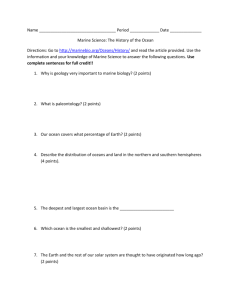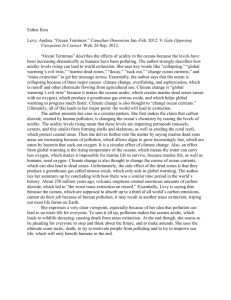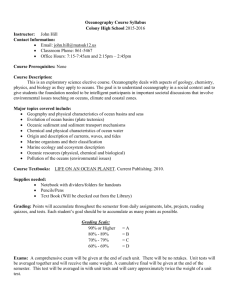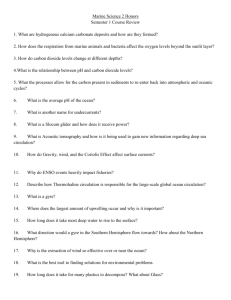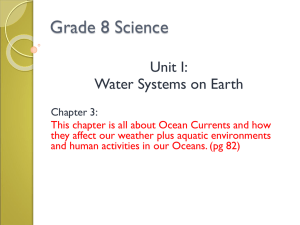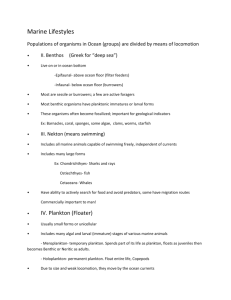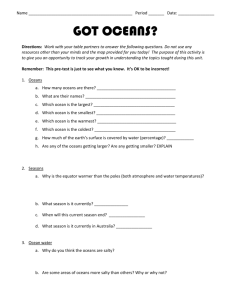IN342_Final_Paper - Journal of International Management
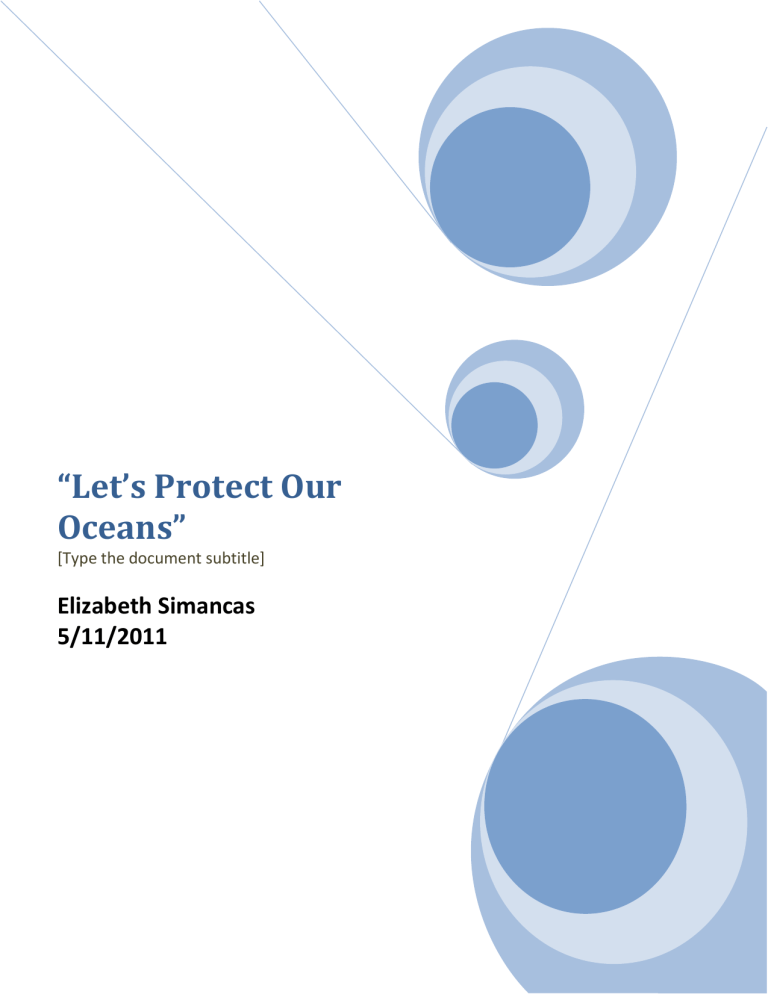
“Let’s Protect Our
Oceans”
[Type the document subtitle]
Elizabeth Simancas
5/11/2011
The Earth is really constituted of about 70 percent water. There is a strong interrelationship between the land and the sea. Unfortunately, we forget that. For that reason, while we have made a greater commitment to protecting the resources on our land, we have not made the same commitment to protecting our oceans.
The oceans are the planet's life support system. We depend on oceans to moderate our climate and filter pollution. We rely on the rich diversity of ocean life to supply us with food and medicines. Our oceans give us a place to play, to work, to rest and to discover. However, oceans are not, as once imagined, inexhaustible resources, so vast that human activity can barely make a dent. In fact, the evidence is just the opposite.
Major threats to ocean health include the following: Overfishing and other destructive fishing practices that deplete our nation's ocean fish populations reduce the diversity of underwater life and lower the resilience of marine systems. Nutrient pollution from farm and yard fertilizer runoff, sewage, and other land-based sources that contributes to harmful blooms of algae, which in turn lead to fish kills and swimmer illness, and ocean "dead zones"-- places devoid of marine life. Coastal development that destroys ecologically sensitive areas and critical habitat for valuable fish species, and also creates a network of paved surfaces that convey oil, grease, and toxic pollutants into coastal waters. Invasive species taking root in marine waters are crowding out native species, damaging ecosystems, destroying the food chain, diluting gene pools and more.
Climate change, which will profoundly impact coastal and marine ecosystems through rising sea levels (and the accompanying loss of coastal wetlands and other important coastal habitat), damage to habitat-rich coral reefs from increased temperatures and threats to shell-forming creatures from ocean acidification, which could have impacts throughout the entire marine food chain.
Pollution in the ocean is a major problem that is affecting the ocean and the rest of the Earth, too. Pollution in the ocean directly affects ocean organisms and indirectly affects human health and resources. Oil spills, toxic wastes, and dumping of other harmful materials are all major sources of pollution in the ocean. People should learn more about these things because the more humans know about pollution in the ocean, they will know more about how to stop the pollution.
Toxic wastes are poisonous materials that are being dumped into the ocean. They harm many plants and animals in the ocean and have a huge impact on our health. Toxic waste is the most harmful form of pollution to sea life and humans. When toxic waste harms an organism, it can quickly be passed along the food chain and may eventually end up being our seafood. In the food chain, one toxic organism gets eaten by another, larger animal, which gets eaten by another animal, and can end up being our seafood. Toxic waste gets into seas and oceans by the leaking of landfills, dumps, mines, and farms. Farm chemicals and heavy metals from factories can have a very harmful effect on marine life and humans.
Many fishermen believe that the toxic chemicals in the ocean are killing much of the fish population. One of the most harmful chemicals in the ocean is lead. Lead can cause many health problems. For instance, lead can damage the brain, kidneys, and reproductive system. Lead can also cause birth defects in people. It has been shown to cause low IQ scores, slow growth, and hearing problems for small children. House and car paint, manufacturing lead batteries, fishing lures, certain parts of bullets, some ceramic ware, water pipes, and fixtures all give off lead.
Many things found in the ocean may cause seafood to be dangerous to human health. The effect on humans from contaminated seafood may include birth defects and nervous system damage.
Medical waste found in the ocean is being tested to see if swimmers have a chance of developing
Hepatitis or AIDS. Other waste has been known to cause viral and bacterial diseases. This type of
pollution can be stopped by watching what pollution we are letting into the ocean. People are trying to decrease the amount of waste in the oceans by recycling as much garbage as they can so there is a smaller amount of very harmful materials in the ocean.
Whenever someone takes their boat onto the water for a ride, it is creating pollution that can be very harmful to the sea life. Boating pollution is the pollution that comes from the boat’s engine when it is running, and it pollutes the water, killing animals with the chemicals in the exhaust from the engine. The engine gives off excess gasoline, which pollutes the waters and ends up killing the animals. In order to make as little pollution as possible, what everyone can do to help is: Only turn a boat engine on all the way when you need to. Do not take your boat out into the water if you do not need to. Be sure to store and transport gasoline in places where there isn’t any direct sunlight because the gasoline will evaporate, and all of the gases that have been evaporated will pollute the air. Every year, buy new or cleaner marine engines for your boats.
Haphazard management of our oceans, coasts and Great Lakes by more than 20 government agencies administering more than 140 federal laws -- and no single body to oversee the countless government actions that affect ocean health and productivity.
Since 1935, Sperry Top-Sider has been the leading brand of footwear for those who love the water. From its introduction of the world's first siped rubber outsole for non-marking traction, to advanced technical fabrication to combat the elements, Sperry Top-Sider remains the vanguard of high-performance amphibious footwear. Sperry shoes have also made a mark in the casual marketplace with its best-selling nautically-inspired collections. Whether one is out at sea or walking the streets, Sperry shoes provide quality boat shoes for comfort.
Since Sperry has been on the scene since 1935, they have been advocating the protection and safety of our Earth’s oceans and its sea creatures. Sperry’s mission statement clearly demonstrates
this cause: “Our passion is the sea. Our priority is to protect it. Two thirds of the world is covered by oceans and it is the ocean that connects and inspires us. We are proud of our partnerships with local communities and global organizations that are dedicated to ensuring that the ocean will always be a beautiful place to play.”
Sperry Top-Sider is a proud partner with OCEARCH, a leader in the fight to save the world’s oceans. OCEARCH is dedicated to the protection and management of the world’s marine resources, focusing on four primary program areas: Research, Education/Awareness, Sustainability, and Marine
Debris.
OCEARCH sells T-shirts through their website, in which 100% of the profits goes to OCEARCH.
Anyone can make a one-time donation to OCEARCH through the website via credit card, debit card
Pay Pal, through the mail or by telephone. Monthly commitment donations ranging from $15-1000 per month are also accepted.
OCEARCH seeks to enhance understanding of our vast marine resources. OCEARCH founder
Chris Fischer has led several expeditions to successfully capture, study, tag and release fifteen great white sharks, obtaining critical data to unlock the many mysteries surrounding this critical apex species. Future projects include additional scientific expeditions to gain valuable insight into the world of white sharks, giant squid, various billfish species, tiger sharks, leatherback turtles, and other marine life.
OCEARCH believes successful conservation depends upon informed citizens. OCEARCH works with numerous national and international conservation organizations to advance both education and awareness of the many issues facing the ocean environment. Their cooperative and innovative approach focuses on results instead of mere politics.
Through partnerships with organizations such as Fischer Productions, a leader in ocean-based television production, OCEARCH is uniquely positioned to translate messages to diverse, widereaching audiences. A series on the great white shark research supported by OCEARCH was televised globally by The National Geographic Channel, reaching a minimum estimated impression level of more than 3 billion people worldwide.
OCEARCH champions a balanced, science-based approach to rebuild, sustain, and conserve our living marine resources. In an effort to protect the critical decline of bluefin tuna stocks, OCEARCH recently co-hosted a screening in the United States Capitol of the acclaimed documentary The End of the Line. Following the screening, a panel of experts, including OCEARCH founder Chris Fischer, discussed appropriate public policy responses to the decline of fish resources and transitioning to sustainable fisheries. Less than a week later the United States announced its support of a proposal to list Atlantic bluefin tuna under the Convention on International Trade in Endangered Species of Wild
Fauna and Flora (CITES) prohibiting international trade of the species.
OCEARCH views sportfishing and anglers as key catalysts of marine conservation and stewardship. They work diligently to educate people on the social, economic, and environmental benefits of protecting sportfishing access. Additional OCEARCH projects including efforts to end shark fining and to promote sustainable seafood choices. OCEARCH works to identify, reduce, and prevent the occurrence of marine debris. An estimated 6.4 million tons of marine debris litters the world’s oceans and coasts, degrading the aesthetic value of shorelines, damaging habitat, harming wildlife through entanglement and ingestion, presenting a hazard to vessel navigation, and serving as a potential transport mechanism for non-native species.
Through developed partnerships OCEARCH is working to educate individuals and industry on the vast extent of ocean pollution and on best practices to prevent accumulation. In our reduction
efforts, we place a specific focus on utilizing debris to benefit the environment, not just displacing debris but working to improve the net impact.
Together Sperry Top-Sider and OCEARCH have come up with ten ways in which people can help protect our Earth’s oceans and their wildlife: (1) Reduce, Reuse, and Recycle. The average
American produces 4.6 lbs of water per day. That is approximately 251 millions of tons nationwide; which is why it is crucial for humans to reduce the amount of water they use. (2) Be an informed seafood consumer. Commercial overfishing is a global concern. Species on the brink of extinction remain on menus and in grocery stores. (3) Use reusable grocery bags. Each year over 500 billion plastic bags are consumed worldwide. The bags are used for a matter of minutes and many end up in the world’s oceans-existing, potentially, for generations. (4) Drink tap water! Each year an estimated
22 billion single serve plastic bottles end up in landfills or the ocean. If you are concerned about the tap water taste and/or quality, buy a water filter. (5) Report illegal dumping to your local U.S. Coast
Guard Sector Office. Laws are in place to protect the ocean and waterways from dangerous materials.
(6) Do not pour oil, engine fluids, cleaners or household chemicals down indoor drains or storm drains. Many drainage systems lead to streams, streams leads to rivers, and rivers eventually lead to oceans. Everyone should properly dispose of these materials according to their labeling. (7) Insist that marinas provide environmentally responsible on-shore restrooms and pump-out facilities. Pollution caused by one weekend of a boater’s untreated sewage discharge is equal to the amount of treated sewage of 10,000 people during the same time period. (8) Properly stow and secure items on your boat. Items that blow into the water may pose a threat to marine life and the environment, plus they are also a navigational hazard to other boaters. (9) Pick it up! Whether on the street or in the water do not pass by liter or contribute to the liter. After all, it takes only a number of seconds to pick by garbage or to throw out your own debris. All marine debris can be traced back to single-source people. (10) Share your passion for the sea by introducing someone to the ocean, especially children!
The average American child spends 44 hours a week with electronic media. Fishing, boating, swimming, beachcombing, surfing and so many other activities are provided by our seas, People who establish a relationship with the ocean are more inclined to protect it.
The reality is that when we talk about protecting our oceans, we are talking about ethical values. We are talking about the value of protecting the resources that Mother Nature bestowed upon us and trying to ensure that those resources are there not only for ourselves but also for our children and their children and their children. There is perhaps no more important ethical value than being good stewards of these resources. That is our obligation, our responsibility.
